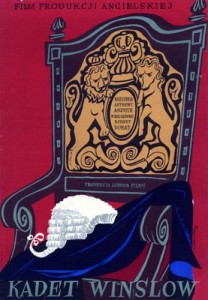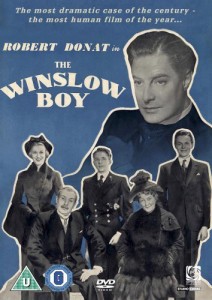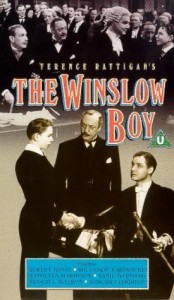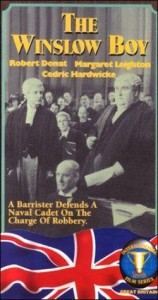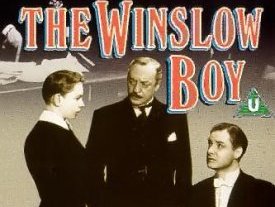The Winslow Boy **** (1948, Robert Donat, Cedric Hardwicke, Neil North, Margaret Leighton, Jack Watling, Basil Radford) – Classic Movie Review 2743
Sir Terence Rattigan’s scintillating, beautifully written stage play comes to the screen in director Anthony Asquith’s respectful, riveting and inspiring 1948 film version with its drama and dialogue almost intact. However, it shows the actual trial, unlike the play and the 1999 David Mamet remake.
It benefits from a strong cast of vintage actors who subtly and engagingly interpret the story of an English Edwardian teenage naval cadet, Ronnie Winslow (Neil North), who is expelled from college for allegedly stealing a five-shilling postal order with another boy’s forged signature.
Robert Donat is the ace barrister Sir Robert Morton who is employed by the boy’s father Arthur Winslow (Sir Cedric Hardwicke) to prove his son’s innocence, and both Donat’s and Hardwicke’s magnificent performances are at the heart of this classic portrayal of an ordinary man’s fight for justice.
While Donat harangues the House of Commons for justice, the family (daughter Margaret Leighton, son Jack Watling) face treacherous friends and Hardwicke comes near to going broke.
This very British, cosy and middle-class film provides an emotional rollercoaster smiles and tears, and is handled with great skill by director Anthony Asquith, and is packed with treasurable performances right down to the often now-famous bit players. There’s an honesty and timeless truth about the central situation that keeps the film contemporary and urgent.
Also in the cast are Frank Lawton, Basil Radford, Kathleen Harrison, Francis L Sullivan, Marie Lohr, Wilfrid Hyde White, Walter Fitzgerald, Kynaston Reeves, Ernest Thesiger, Lewis Casson, Stanley Holloway, Cyril Richard, Philip Ray, Dandy Nichols, Noel Howlett, Betty Marsden and Mona Washbourne.
In the 1999 remake by writer-director David Mamet, Neil North, the lad who plays the original Winslow Boy, plays the First Lord of the Admiralty. Mamet says he had already cast North in the film before he was told that he’d also appeared in the 1948 version.
The play was inspired by an actual real-life London story, which set a legal precedent. It was the case of George Archer-Shee, a cadet at Osborne in 1908, who was accused of stealing a postal order from a fellow cadet. On the fourth day of his trial, the Solicitor General accepted that he was innocent, and the family was paid compensation. He was killed in the First World War.
© Derek Winnert 2015 Classic Movie Review 2743
Check out more reviews on http://derekwinnert.com

